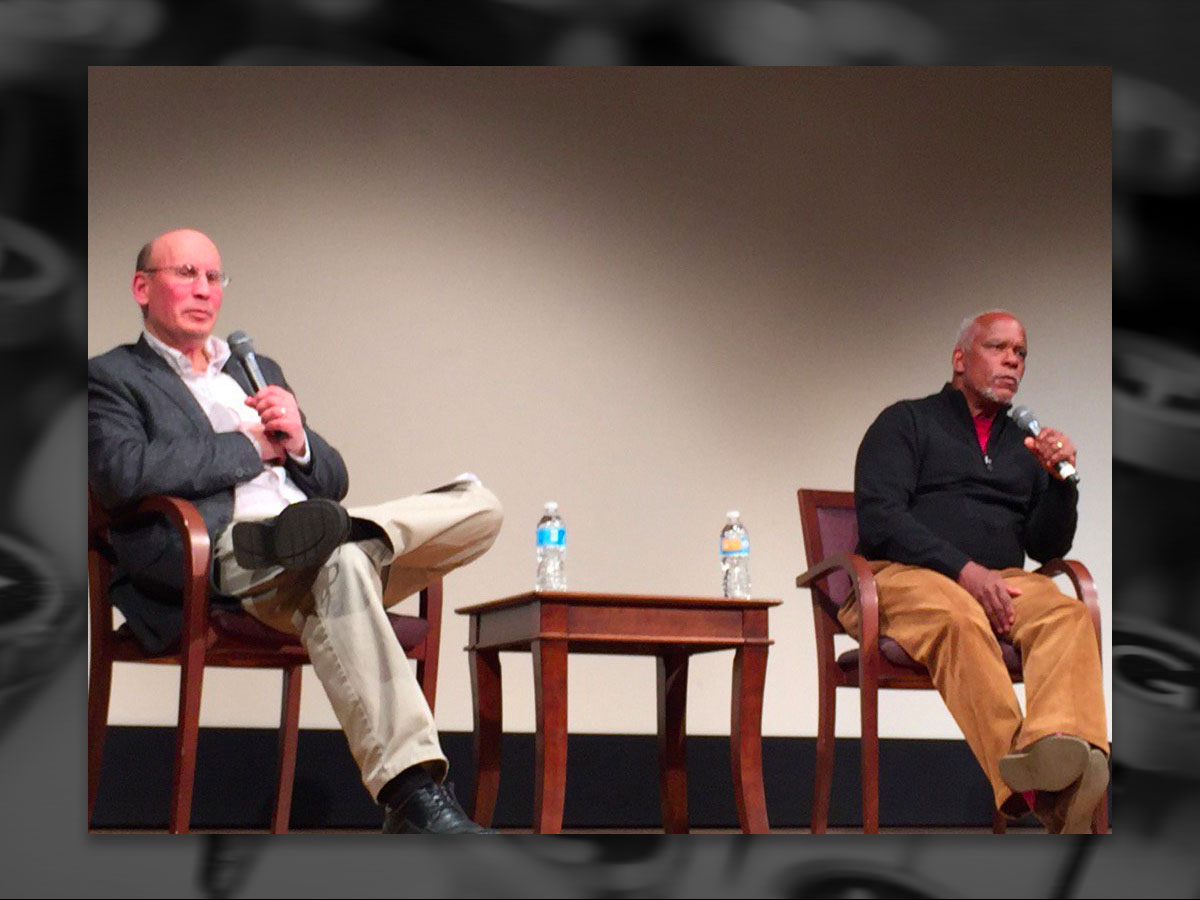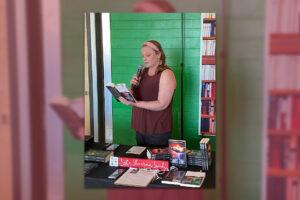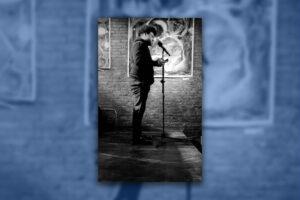by Jesse Seidel
This Thursday, I had the honor of interviewing prestigious Writers Institute’s Assistant Director Mark Koplik, below is the interview in its entirety for ones reading pleasure.
JESSE: I suppose we should start out with…why did you choose to work with the Writers Institute?
Mark: Well, I came here in to Albany in 1993 to join the Ph.D program here. And then in 1995 I got a Graduate Assistantship, the second Grad Student to get one, it was a new program, and I liked it a lot, I was more interested in what was going on here than what was going on in the English Department, I… the English Department at the time was very theory focused and I wasn’t very interested in theory, I was more interested in Literature and there was just such a variety of literature being presented and celebrated here, I really felt… I found a place where I wanted to be. My graduate assistantship ran out I was asked to come back as a part time employee that evolved, ultimately, into a full-time job and now I’m Assistant Director of the Writers Institute.
J: You said you wanted to be here due to your interest in literature do you recommend any books or authors to people?
M: Oh, I’d recommend them ALL, what we do here is we try to present the widest possible diversity of genre, of cultures, and its really a feast of many different kinds of literature. Even from the current season, stuff I’ve been immersed in, I really recommend Roscoe by William Kennedy, I mean I recommend all of his books, but Roscoe is wonderful book about politics and political corruption in Albany.
J: I believe I heard an excerpt of that from his speech at his birthday celebration a few weeks ago.
M: Right, right, you were at city hall?
J: Yes.
M: Yeah, that’s right, yeah that was a performance of just a very short passage of that book. So that’s a great book. I really recommend ‘The Girl at the Baggage Claim’ its about how different cultures, particularly Eastern and Western cultures view the world so she would actually analyze a painting from China or a picture of a lion on a savannah, and talk about how the kinds of perspectives that different cultures, East versus West, might bring to viewing these cultural artifacts and its just fascinating. (The author has) Been here before. I saw her when she came, like, twenty years ago and I really enjoy her work. It’s really very much about the Chinese-American experience in multicultural America.
J: Yes, it’s certainly a relatable experience for many people out there, not myself personally. [chuckles]
M: Right, right, of course. And then…I mean, you know, right now I am reading Midnight’s Children, the recipient of one of the most prestigious awards of all of contemporary literature. Not just the booker, but the Booker of Bookers. And it’s about the birth of the modern nation of India with all of its internal diversity and its Muslim and Hindu and different castes within India and its relation to its British-Colonial heritage and it’s a really interesting book. And, what else have I been looking at lately…
J: Anything apart from the Writers Institute.
M: Oh, just for my own personal pleasure?
J: Yes.
M: Absolutely, I just finished a novel called ‘Victoria’ written by an Iraqi Jew living in Israel. He’s a communist and its really one of the great works of Israeli literature but it is almost unknown in this country and I interviewed him once in Israel. I was sent by WMHT to interview Israeli authors.
JESSE: What was his name?
MARK: Sami, S-A-M-I is his first name. And his last name is Michael, spelled M-I-C-H-A-E-L.
JESSE: Right, right, Michael with the Hebraic pronunciation.
M: Yep, Mhm.. It’s this sweeping family saga, very dysfunctional family, lots of abuse, very kind of candid presentation of the treatment of women. But really, really, really interesting book.
M: Also, what else, most recently…a Book called the ‘Oregon Trail’ by a journalist who retraced the Oregon Trail in an authentic covered wagon he built with his brother. They got some mules and it’s the contemporary landscape of the Great Plains and the American West. Families struggling with issues like drug abuse and internet addiction, but also the deep history of the Oregon Trail, the cholera epidemics, the relationship with Native Americans, and all kinds of things.
J: That one actually sounds really interesting.
M: Yeah, it’s really interesting.
M: I’m trying to think what else, I’ve read some other stuff…trying to remember what it was. Certainly, I’ve been thinking about the poetry of Tyehimba Jess, I don’t know if you were here for any of those events.
J: I don’t think so.
M: He’s a 2017 Pulitzer Prize winner and he visited here last semester and he writes poems about the African American experience that can be read in multiple directions. So, on the page you’ll have pieces of poetry, and you can navigate, you can create your own poem by navigating through the-
J: A choose your own adventure poetic experience.
M: Exactly. It is like that, a choose your own adventure experience.
J: I, personally, when not busy with school have been going through the Dresden Files by Jim Butcher and Terry Pratchett’s Discworld.
M: Tell me the name of that last one again?
J: Terry Pratchett’s Discworld series?
M: D-Discworld?
J: Yes.
M: And that’s Science Fiction or…?
J: It’s Fantasy. Like, if you are a fan of Fantasy and you know, like, fantasy literature from like, 80’s onwards, I’d highly recommend it.
M: Right, okay, yeah, I’d be interested in reading it. As you might imagine, with all that I need to read for work, I don’t have a lot of free time. However, one thing that we’re doing, that we’re making it our business to do is to bring more attention to genres that we haven’t really focused on in the past, like graphic novels, like young adult literature, and certainly even Sci-Fi and Fantasy. I’m not in a position to tell you who they are, but we have something set with a graphic novelist and comic book artist for the Fall and I’ve been working today on bringing a particular science fiction author, but we tend not to share.
J: Right, of course. I believe I heard last semester from someone at the Writers Institute that you’ve been trying to get Neil Gaiman here for a while?
M: Definitely, he’s so in demand that we really can’t afford him.
J: I heard he needs a lot money.
M: Yeah, he needs a LOT of money, and he’s represented by a literary agent who is very good at getting very high fees.
M: If you have any you’d like to recommend, we are certainly interested in what’s out there and you’re aware that we’re bringing Mark Guggenheim.
J: I’m particularly excited for the Patti LuPone one in April.
M: Great, cool.
M: What is the name of the new website?
J: It is the New York Writer’s Compendium.
M: And it’s live already?
J: It will be within the week, and until then we have our Facebook page which is just, you can probably find it by just typing ‘Compendium’ with uh, two periods between the ‘pen’ syllable.
M: Right.
J: Because it’s the Com.pen.dium.
M: I got it.
J: I guess my next question is, without divulging too much, of course, if you could personally bring somebody on for the Writer’s Institute to present who would it be?
M: Uh-
J: Assuming its not already somebody coming in the Fall that you can’t say.
M: Right, there’s certainly a lot of authors I’d love to bring here who haven’t been here. Michael Chabon and Phillip Roth, definitely. And…Toni Morrison I would bring. She had a fellowship here before my time, like thirty years ago. She was in the office of the Writer’s Institute when it was being founded. And we’ve long wanted to bring her back. Is that enough?
J: Yes.
J: I had a few more questions but not too many…are you yourself a writer?
M: I mess around, but I am not published.
J: What do you prefer to write? Poetry or short stories?
M: No, I prefer fiction.
J: What kind of fiction if I may be so bold?
M: Oh, what kind of fiction? I guess I’m interested in Historical Fiction.
J: What time period?
M: I’m interested in ancient and medieval time periods.
J: That’s fair, those are both interesting times. Like, what, Roman to Medieval?
M: Yeah, Roman, Medieval-
J: Or more like Mesopotamian?
M: I’m interested in Mesopotamian, I’m interested in ancient Mesopotamia and Egypt.
J: I feel like there’s not a lot of fiction for stuff predating the Roman Empire, but I’m not really well versed enough in the genre to say for sure.
M: Right, yeah, I don’t- I have to confess that although I play around with it, I’ve read more history than I have historical fiction from those time periods. So, I’m not certain just how much there is.
J: Do you have any advice to the English Majors or Humanities fields? And I’m thinking this will be like, one of the last questions.
M: Sure. I would say that creative writing and creative thinking have a very wide application, it’s a very useful skill to have in life. We’re not in any way an academic department and in some ways we’re certainly an arts organization but in some ways we’re an entrepreneurial enterprise. We’re always trying to invent some very interesting new programming, and I can imagine the kind of skill I learned from fiction I’m applying to that sort of day to day creativity in this office, and I’d say that the skills from reading and writing can be applied to any creative endeavor be it social, or political, or business, or solving the planet’s problems.
J: I believe that is enough. Do you have any questions for me?
M: So, you’re an English Major?
J: Yes, I’m an English Major with a Minor in Creative Writing.
M: How is the Creative Writing Minor going? Are you enjoying that program?
J: I am, I recently, last semester took Professor Kaul’s class, his first one actually and it was really interesting, especially towards the end when we had Nic Stone thanks to the Writer’s Institute. And since that was specifically a Fiction Workshop, which I want to specialize in, I think it really helped me with the sort of ‘stamina’ as it were to write longer short stories.
M: Yeah, part of the purpose of our Program is to create opportunities for aspiring writers, to meet writers who have already achieved some success, and show them what it’s like to practice the craft, and get up in the morning and sell your work, and those human connections humanize literature, making it less abstract, to imagine yourself in that role.
M: Alright! Well it was nice meeting you!
J: It was nice to meet you, sorry if this interview was lacking in any way.
M: No, it was great, and if you have any other questions. I’d be happy to answer some questions.
J: It was a pleasure to interview you, and this should be live on our website within the week.





